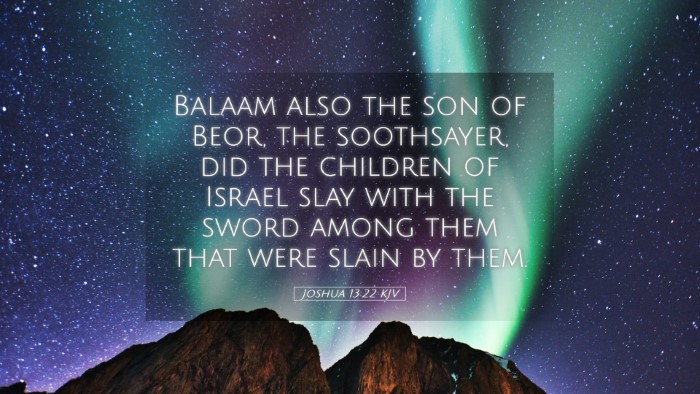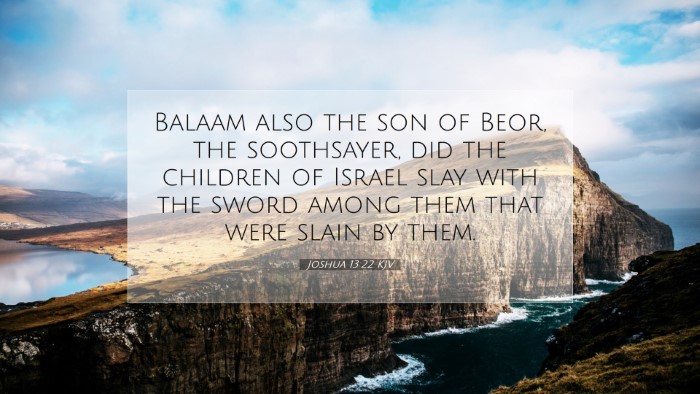Bible Commentary on Joshua 13:22
Verse Analysis: Joshua 13:22 states, "And Balaam also the son of Beor, the soothsayer, did the children of Israel slay with the sword among them that were slain." This verse addresses the destruction of Balaam, who is presented as a significant antagonistic figure within Israel's history.
Contextual Background
This verse appears within the broader narrative of the division of the land of Canaan among the tribes of Israel after their conquest. The reference to Balaam serves not only as a historical note but also as a theological lesson demonstrating the consequences of opposing God’s will.
Commentary Insights
-
Matthew Henry:
According to Matthew Henry, Balaam symbolizes the kind of worldly wisdom that is in direct conflict with the divine purposes of God. He was called to curse Israel but, unable to act against God, ended up advising Balak to lead Israel into sin through moabite women. This commentary implies that the judgment upon Balaam underscores a profound warning against seduction by worldly desires and false teachings.
-
Albert Barnes:
Albert Barnes highlights that Balaam, despite his prophetic gifts, failed to submit to the will of God and ultimately sought to exploit his relationship with God for personal gain. His death by the sword signifies the inevitable consequences that arise from leading God's people into sin. Barnes indicates that the mention of Balaam also served as a historical reminder of the dangers that accompany carnal ambitions.
-
Adam Clarke:
Adam Clarke provides insights into the character of Balaam, stressing that his life reflects the duality of a man gifted by God yet ensnared by greed. Clarke interprets Balaam's demise as a fulfillment of prophetic justice, demonstrative of God's power to execute judgment upon those who betray His calling. Clarke's analysis prompts the reader to consider the seriousness of divine judgment against those who exploit spiritual gifts for selfish desires.
Theological Reflections
In examining the story of Balaam, there are several theological implications worthy of contemplation:
-
The Nature of False Prophets:
Balaam represents those who exploit their spiritual gifts for selfish motives. The scriptures warn about the presence of false prophets and the importance of discernment within the community of faith.
-
God's Sovereignty:
The defeat of Balaam emphasizes God's control over human affairs. Despite Balaam’s intentions, God's purpose prevails, illustrating His sovereignty in guiding and protecting His people.
-
Consequences of Compromise:
Balaam’s actions led to his downfall. Those who compromise their faith may find themselves facing dire consequences, affirming the need for integrity and fidelity in one’s walk with God.
Application for Today
This commentary on Joshua 13:22 serves as a pertinent reminder for contemporary believers:
-
Faithfulness Over Convenience:
It is crucial to remain steadfastly faithful to God's calling even when there are temptations to choose a path that seems advantageous but is contrary to His will.
-
Discernment in Leadership:
Church leaders and teachers must exercise discernment, ensuring that their teaching aligns with God's truth and does not lead others astray.
-
The Importance of Accountability:
Community accountability within the faith community is essential to protect against influences that could draw members away from God's path.
Conclusion
Joshua 13:22 provides a powerful reminder of the consequences of betrayal and the risks associated with corrupt motives in the context of spiritual leadership. The insights from early commentaries evoke a sense of historical responsibility in understanding and applying these principles in our lives today.


